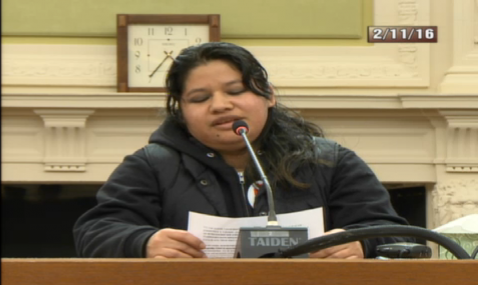WASHINGTON – When Dalia Catalan’s one-year-old son got sick, she requested a day off from her hotel job to take him to the doctor.
She was subsequently taken off the work schedule for a week and on the Monday after that, she was fired.
“My jaw dropped when they told me I shouldn’t even try and come to work,” Catalan recalled last week, speaking in Spanish through an interpreter at a hearing by the D.C. Council on a bill that would allow District residents and workers employed in the city to receive up to 16 weeks of paid family and medical leave.
.
About 130 others testified as well, sharing their stories, or arguing for or against the legislation, which would enact one of the most generous paid leave programs in the country.
Catalan, a resident of D.C.’s Ward 4, situated in the northern section of the city, said losing her hotel job wasn’t the first time she had been discriminated against. When she was eight months pregnant with her son, Catalan said that her boss told her to not come back into work and that her time away would be an unpaid vacation. A month after her son was born, she was told to come in the next day or risk being fired.
The District of Columbia started offering eight weeks of paid leave to government employees last year. Only three states currently offer paid family and medical leave: California, New Jersey, and Rhode Island.
The proposed bill would expand the right of paid family and medical leave to all employees working in the District, excluding federal government and District government employees who reside outside the city. The city would set up a fund to which private employers would contribute a up to 1% of what they pay an individual in annual salary.
Earlier last week Phil Mendelson, chairman of the council, proposed a reduction of the 16 weeks of paid to leave to 12 weeks and a reduction of the maximum weekly benefit from $3,000 to $1,500.
But David Grosso, I-At Large, and one of the original sponsors of the bill, objected.
“My fear is that the more narrow we make it, the more often we will have to come back and amend this law as we realize the mistakes we made,” Grosso said.
Critics of the bill argue that it is too broad concerning who would benefit and that there is still not enough information to determine how much implementing it will cost the city and businesses.
Kathy Hollinger, president and CEO of the Restaurant Association of Metropolitan Washington, was among those expressing reservations about the current version of the bill.
“We believe that since the true cost is unknown, so is the true cost to the business,” Hollinger said.
Supporters of the bill argued that the high cost of living in the District called for greater assistance to families.
Elizabeth Davis, president of the Washington Teachers Union, said that no one should have to choose between providing and caring for his or her family.
“Students that worry about sick parents going to work or that shoulder care-taking responsibilities because their families cannot are less able to excel in the classroom,” Davis said.
Mathew Hanson, campaign director for D.C. Working Families, a political organization that advocates economic equality for families in the city, said that it was getting increasingly more difficult for families to make ends meet in the District and that this trend was alarming.
“Without legislation like the Universal Paid Leave Act, more and more families will be forced to leave the city they call home,” Hanson said.
Ashe McGovern, a policy analyst for the Center for American Progress, called for a greater consideration of the LGBT community’s needs when drafting the final bill.
“LGBT workers and their families are more likely than their non-LGBT peers to live in poverty, face unemployment, and experience workplace discrimination,” McGovern said. “Therefore, they are more job insecure and vulnerable.”
McGovern asked the council to use the U.S. Office of Personnel Management’s definition of family, which includes family members that are not related biologically but are considered to be the equivalent, such as adoptive children of LGBT parents.

